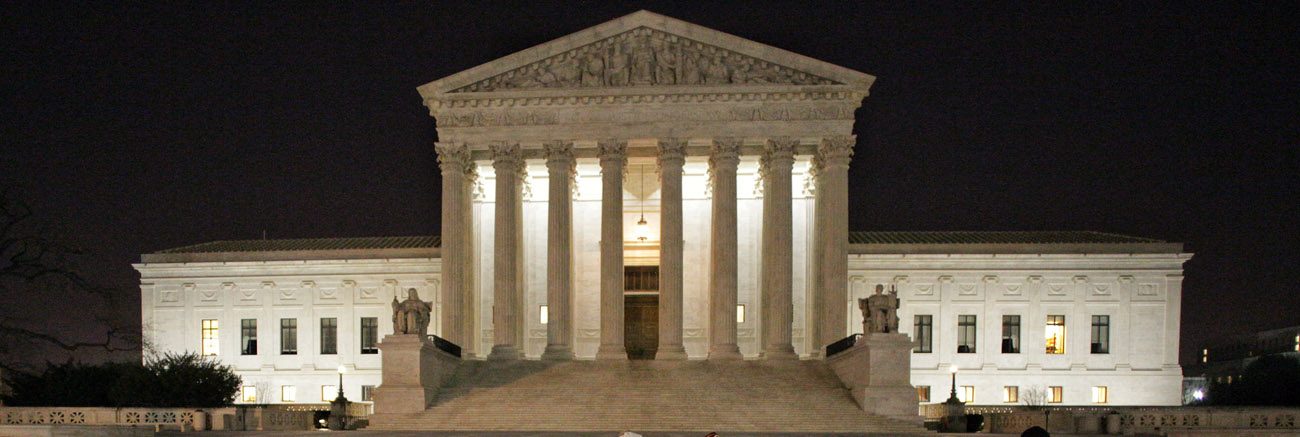WASHINGTON (CNS) — The U.S. Supreme Court, with just weeks to go in its current term, has yet to release major decisions on two issues of concern to the Catholic Church: immigration and abortion.
The immigration ruling will determine the legal status of more than 4 million people who are currently protected from deportation by President Barack Obama’s executive actions on immigration policy, actions that have been challenged by 26 states.
At issue in United States v. Texas, argued before the court in April, are Obama’s 2014 expansion of a 2012 program known as Deferred Action for Childhood Arrivals, or DACA, and creation of the Deferred Action for Parents of Americans and Lawful Permanent Residents, known as DAPA.
[hotblock]
The programs had been put on hold last November by the 5th U.S. Circuit Court of Appeals in New Orleans, upholding a Texas-based federal judge’s injunction against the executive actions.
The states suing the federal government claim the president went too far and was not just putting a temporary block on deportations, but giving immigrants in the country without legal permission a “lawful presence” that enables them to qualify for Social Security and Medicare benefits.
U.S. Solicitor General Donald B. Verrilli Jr., defending the government, said the “pressing human concern” was to avoid breaking up families of U.S. citizen children, something echoed by the U.S. Conference of Catholic Bishops, Catholic Legal Immigration Network Inc., or CLINIC, and at least three Catholic colleges, which joined in a brief with more than 75 education and children’s advocacy organizations.
If the court’s decision is a 4-4 split, it would leave in place the appeals court ruling blocking the Obama administration’s plan.
In a recent update to the case, U.S. District Judge Andrew S. Hanen of Brownsville, Texas, June 7 postponed a sweeping order he issued in May that would have required that Department of Justice lawyers working on the case to attend ethics courses.
The judge gave no explanation for the revised order and simply delayed it until Aug. 22 when he will hold a status conference. Scotusblog.com, a blog on the U.S. Supreme Court, noted that his action clears the way for the court to rule on immigration policy without a distraction.
The other major case awaiting a court decision concerns abortion clinics. In March, the court heard oral arguments in its first abortion case in nine years: Whole Woman’s Health v. Hellerstedt. The case is a challenge by Texas abortion clinics to a 2013 state law that requires them to comply with standards of ambulatory surgical centers and their doctors to have admitting privileges at local hospitals.
[hotblock2]
Opponents of the law say its requirements are aimed at closing abortion clinics and have created an “undue burden” on women who want an abortion; the state maintains the law is protecting women’s health.
The USCCB and other religious groups submitted a joint friend of the court brief in the case supporting the Texas law. The brief said the Supreme Court has held since Roe v. Wade, the landmark 1973 case legalizing abortion in the U.S., that states may enforce standards regarding the qualifications of doctors who perform abortions and the conditions of facilities in which abortions are carried out.
If the justices vote 4-4 in a decision on this case, they will uphold a lower court’s decision approving the Texas law, but the case would not set a national precedent. The predicted vote was not clear cut since Justice Antonin Scalia, who died in February, regularly voted to uphold limitations on abortion and was expected to have provided the fifth vote to uphold the Texas requirements for abortion clinics.
Another option is that the court could send the case back to the lower courts to get a clearer picture of how the law affects local clinics.
Rulings in both cases will be announced by the end of June.
PREVIOUS: Cardinal Tagle to serve as spiritual director at U.S. bishops’ retreat
NEXT: Foundation named for St. Padre Pio honors actor, former ambassador




Share this story